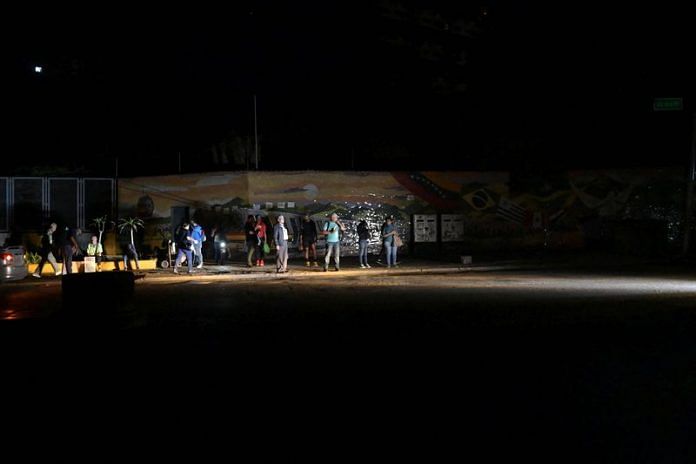By Mayela Armas and Vivian Sequera
CARACAS (Reuters) – Venezuela’s capital Caracas and much of the rest of the country experienced a blackout early on Friday, though power was set to gradually return, the government said, blaming the blackout on sabotage by the opposition without providing any evidence.
President Nicolas Maduro, who is locked in a dispute with the opposition over the outcome of a July 28 presidential election, often blames “attacks” on the power grid on his political rivals, accusations the opposition has always denied.
Power will begin returning soon, beginning with the capital, Interior Minister Diosdado Cabello told state television just before 10 a.m. local time (1400 GMT), reiterating government claims of an attack.
“It will begin arriving little by little nationally, with security protocols,” Cabello said.
The blackout also hit some key operations of state oil company PDVSA, including the country’s largest oil terminal, Jose, where vessel loading and discharging was interrupted by the outage, according to sources and a shipping document seen by Reuters.
About 70% of Venezuela’s oil exports are handled through Jose, which does not have its own power system.
Some units of the 146,000-barrel-per-day El Palito refinery were out of commission, sources said, and PDVSA’s Caracas headquarters lost power.
The company’s largest refining complex Paraguana was unaffected, as its own power plant was in service, the sources said.
All 24 of the country’s states reported a total or partial loss of electricity supply, Freddy Nanez, the minister of communication and information, said on state television early in the morning.
“We have been victims once again of electrical sabotage,” he said. He gave no evidence of a deliberate attack.
Nanez also blamed a series of smaller blackouts which affected some states on Tuesday on sabotage.
An opposition spokesperson did not immediately respond to a request for comment.
In Caracas, workers gathered outside office buildings in the central Plaza Venezuela early in the morning.
“We don’t know how long this will last,” said office cleaner Bartolo Polanco, who arrived by bus from his home in the satellite city of Guarenas and was waiting outside with colleagues.
“We’re waiting for our boss’ instruction to go home if we can’t work,” he said.
Bakery worker Alejandro Rondon, 25, said the card payment machine was still working and he was selling what he could.
“We can’t make anything today because the ovens aren’t working. My fear is for the yeast, which needs to be cold,” he said.
Services on the city’s metro were halted and had been replaced by more than 250 buses, Transport Minister Ramon Velasquez said.
ELECTION DISPUTE
Venezuela’s government and opposition both say their candidate won last month’s election, with the electoral authority and Supreme Court backing Maduro. Authorities have not released full vote tallies despite international calls to do so.
Arrests of opposition figures have risen sharply over the last week.
Former opposition candidate Edmundo Gonzalez and opposition leader Maria Corina Machado are being investigated for incitement and other crimes by Attorney General Tarek Saab.
Gonzalez has ignored two summons to testify about a website where the opposition has posted what it says is more than 80% of ballot box vote tallies, which show a resounding win for him.
A third citation for Gonzalez was issued for Friday, but it was unclear if it remained valid amid the blackout. Saab did not immediately respond to a text message seeking comment.
Venezuela suffered three national blackouts in 2019, with some lasting as long as three days. Authorities also attributed those power outages to attacks on the network – such as damage to power lines – by saboteurs and opponents of Maduro’s government.
Maduro has presided over a sharp economic deterioration since he took office in 2013.
(Reporting by Vivian Sequera, Mayela Armas and Deisy Buitrago in Caracas and Marianna Parraga in Houston; Additional reporting by Mircely Guanipa in Maracay and Tibisay Romero in Valencia; Writing by Julia Symmes Cobb and Natalia Siniawski; Editing by Kirsten Donovan, David Holmes, Helen Popper and Jonathan Oatis)
Disclaimer: This report is auto generated from the Reuters news service. ThePrint holds no responsibilty for its content.



